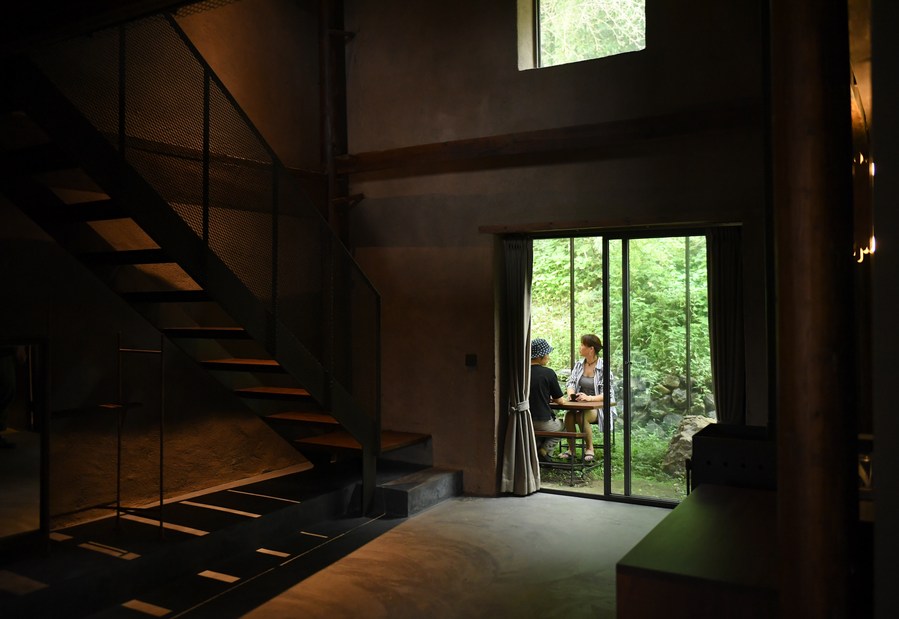Common prosperity evident in east China's Zhejiang

A tourist sits in a sea-view room of a cliff-side homestay hotel built on the sea island of Nanji, Wenzhou City, east China's Zhejiang Province. (Xinhua/Xu Yu)
HANGZHOU, June 22 (Xinhua) -- Though tea gardens in Jingshan Township of east China's Zhejiang Province have turned quiet after the end of a busy spring harvest season, locals continue to live bustling lives welcoming tourists.
Getting up early in the morning, Sheng Wen and her husband prepared rice cakes, Chinese sticky rice dumplings, bamboo shoot porridge and, most importantly, Jingshan green tea, for guests of their Airbnb.
"I was born in the township's Jingshan Village and worked in Hangzhou (capital of Zhejiang), after graduating from university," said Sheng. "As my family gradually moved to the city, the old house in the village stood idle and empty. In recent years, the flourishing tourism industry in Jingshan has encouraged more homestays, and I jumped on the bandwagon in 2018, turning the old house into an Airbnb."
Though her house has only been open for a year, chatting with guests from different places about the scenery and life in the mountains has become Sheng's favorite activity.
"The COVID-19 pandemic has dealt a blow to our business but now we manage a monthly turnover of around 5,000 yuan (about 775 U.S. dollars). The upcoming summer vacation is expected to be a peak period," said Sheng.
Over the years, green tea cultivation and other relevant industries have brought fortune to the locals of the Jingshan township, with Xiaogucheng being another example.
In March 2019, Xiaogucheng established a village-level tourism company and hired professional managers. During the first three days of this year's May Day holiday, the ticket income of all scenic spots in the village reached 150,000 yuan.
"We are working to build a 'community of common prosperity' with nearby villages. If every village works hard and every villager makes effort, we will not be far from that goal," said Lin Guorong, Party secretary of Xiaogucheng Village. "After all, it cannot be regarded as common prosperity if there's only one prosperous village."

Tourists have a rest at a homestay deep in the mountains of Anji County, Huzhou City, east China's Zhejiang Province. (Xinhua/Weng Xinyang)
Being one of China's most developed provinces, Zhejiang has laid a solid foundation for the pursuit of common prosperity.
As a key indicator of balanced development, the income ratio between urban and rural residents in Zhejiang fell to 1.96:1 last year, much lower than the national level.
Central authorities issued a guideline on June 10 on building the coastal Zhejiang Province into a demonstration zone for achieving common prosperity.
"Common prosperity is not only a concept of social development but also a social change marked by narrowing the gap between regions, urban and rural areas and in people's incomes," said Yuan Jiajun, Party secretary of Zhejiang.
Zhejiang could set an example in reducing the gap between urban and rural areas, noted Lebanon's Ambassador to China Milia Jabbour who visited the province in June.
Photos
Related Stories
- 22nd Zhoushan Int'l Sand Sculpture Festival to be held in E China
- China Focus: Eyeing common prosperity, Zhejiang sets example of people-centered development
- China-CEEC trade booming with bright prospects
- China to build Zhejiang into demonstration zone for common prosperity
- China's Zhejiang boasts over 60,000 5G base stations
Copyright © 2021 People's Daily Online. All Rights Reserved.










